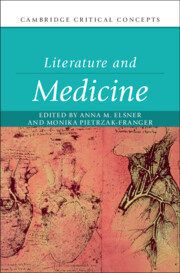Book contents
- Literature and Medicine
- Cambridge Critical Concepts
- Literature and Medicine
- Copyright page
- Dedication
- Contents
- Figures
- Contributors
- Acknowledgements
- Medico-Literary Pathways, Crossroads, and Side Streets
- Part I Origins: Histories
- Part II Developments: Forms
- Part III Applications: Politics
- Chapter 15 Malaria Literature
- Chapter 16 Forgotten Class
- Chapter 17 The Human Endeavour
- Chapter 18 Re-framing and Re-forming Disability and Literature
- Chapter 19 Overcoming Decline (in) Narrative
- Chapter 20 Literature as a Form of Care?
- Chapter 21 Literature in Collaboration
- Afterword
- Index
Chapter 16 - Forgotten Class
French Literature, Medicine, and Poverty
from Part III - Applications: Politics
Published online by Cambridge University Press: 17 January 2024
- Literature and Medicine
- Cambridge Critical Concepts
- Literature and Medicine
- Copyright page
- Dedication
- Contents
- Figures
- Contributors
- Acknowledgements
- Medico-Literary Pathways, Crossroads, and Side Streets
- Part I Origins: Histories
- Part II Developments: Forms
- Part III Applications: Politics
- Chapter 15 Malaria Literature
- Chapter 16 Forgotten Class
- Chapter 17 The Human Endeavour
- Chapter 18 Re-framing and Re-forming Disability and Literature
- Chapter 19 Overcoming Decline (in) Narrative
- Chapter 20 Literature as a Form of Care?
- Chapter 21 Literature in Collaboration
- Afterword
- Index
Summary
Looking at French writer Édouard Louis’s oeuvre – including En finir avec Eddy Bellegueule (The End of Eddy) (2014), Qui a tué mon père (Who Killed My Father) (2018), Changer: Méthode (Change: Method) (2021), Combat et Métamorphoses d’une femme (Battles and Metamorphoses of a Woman) (2021), and Dialogue sur l’art et la politique (Dialogue on Art and Politics) (2021) – this chapter analyses the relationship between (white) working-class/poor individuals and medicine, masculinity and care. This study sheds light on Louis’s strategy to deploy a ’democracy of care’ – that is, a type of social organization grounded in equality, more horizontal relations, and which values care (and care workers) over economic production – by using his artistic practice to draw attention to lived experiences of trauma, pain, silence, and social invisibilization. Further, it does not only appear that Louis’s writing about pain serves to reflect on France’s healthcare policies and inequalities, but also that power dynamics (such as patient-doctor) inform his writing practice.
- Type
- Chapter
- Information
- Literature and Medicine , pp. 281 - 296Publisher: Cambridge University PressPrint publication year: 2024

